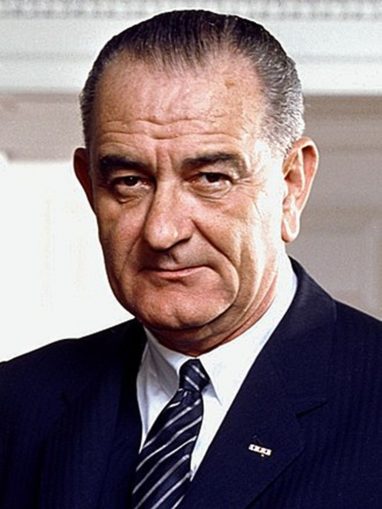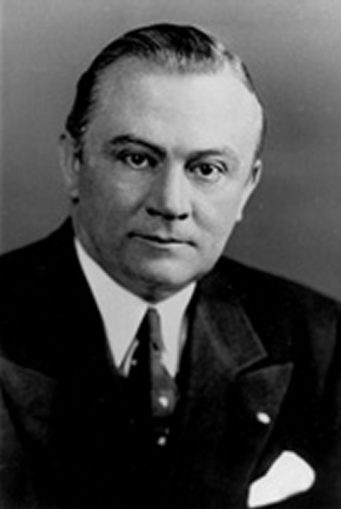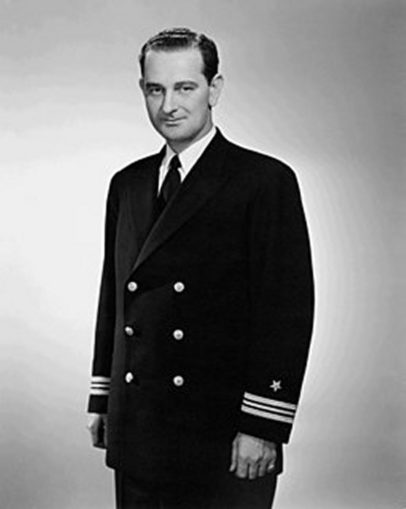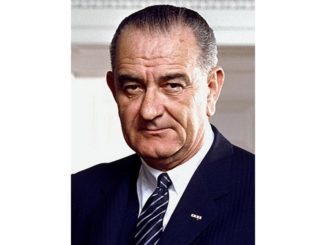
Public Domain
“The power of money was less ephemeral than power based on elections or individuals. It could last as long as the money lasted, exerting its effect not only on an incumbent but on his successors. And there was enough oil in Texas so that it would last, in political terms, a long time. Lyndon Johnson had become the conduit for the oilmen’s money. To the extent that he could remain the conduit, his power would endure.” [The Years of Lyndon Johnson: Volume 1: The Path to Power (1982) – p. 660]
“In election campaigns in college and for the Little Congress, he had demonstrated a pragmatism that had shaded into the morality of the ballot box, a morality in which any maneuver that leads to victory is justified. Now he displayed the same morality on a larger stage.” [Vol. 1 – p. 704-5]
First Senate Campaign
Lyndon Johnson, despite having achieved much for someone so young, particularly in being elected to Congress at just 28 years old, didn’t want to spend long in the House of Representatives; he sought to advance as quickly as possible to the next rung on the ladder to power. In 1941 he had his chance when one of the Senators for Texas, Morris Sheppard, died. Although this would initially be a battle for the Democratic nomination as opposed to the Senate seat itself, the winner was virtually guaranteed a place in the Senate when it came to a full election because Texas at that time was a strongly Democrat state.
Johnson would be battling against the odds again as several potential competitors were much better known. In fact, Johnson used his influence with Roosevelt to persuade him that one of those rivals, Gerald C. Mann, the Attorney General, wasn’t loyal to the New Deal, which was false. (He would make the same insinuations to Roosevelt about Sam Rayburn.) Johnson persuaded Roosevelt that he was the best candidate to defeat either W. Lee “Pappy” O’Daniel, the popular state Governor and a conservative isolationist, or Martin Dies, a Congressman who was a protégé of Roosevelt’s Vice President, John Nance Garner, whom Roosevelt had severely fallen out with. The President tacitly endorsed Johnson.
Mann didn’t take the Johnson threat seriously enough and found himself out-organised and out-funded. Dies, although a good public speaker, was infrequent in his speeches and toured little; and although he had good financial backing, he used little of it and his support base dwindled.

Public Domain
O’Daniel, however, was a different story. Prior to becoming Governor he had been a flour salesman with no political experience and had gained a platform through being given a radio show where he used a folksy charm to sell first his flour and then himself. His candidacy for Governor had not been taken seriously by many politicians or the press, who noted his lack of political experience and treated him as something of a joke, a showman, who drew crowds for sure, but they thought this was because of the musical entertainment shows he put on with the band he hired, not because of politics. But people came because they liked him too and he had been able to resonate with them for years by speaking to them through the radio. He ran for Governor, he said, to throw the “professional politicians” out of Austin, a populist message which resonated where there was a heavy contrast between “the state’s newfound and rapidly growing natural wealth and the poverty of its government.” [Vol. 1 – p. 701] Press and politicians predicted that the novelty would wear off, but instead the crowds grew. He ended up getting more votes than all of the other eleven candidates combined. He would face a hostile legislature but the voters would continue to support him. O’Daniel announced his candidacy for Senate during the sixth week of the campaign, in May of 1941, which came as a nasty surprise to Johnson, who he had previously reassured that he would not run. But Johnson was up for the fight.
Johnson not only offered help to obtain grants for communities but went as far as to threaten some that they wouldn’t receive grants if they didn’t support him. He was cynical too, in proclaiming himself as a New Dealer and yet entering into an alliance with San Antonio’s “City Machine”, a political organisation profoundly hostile to the New Deal. He also aped O’Daniel by having musical entertainment at his rallies. And money was essentially handed out, in the form of “Defense Bonds” and “Stamps” that could be won in lotteries.
He also used more subtle tactics, one being the argument that O’Daniel was too vital as Governor to give up that position, an argument which proved persuasive. Another was using his allies to reach out to friendly legislators to prevent the current legislative session from coming to an end, meaning that O’Daniel was prevented from campaigning for some time as he had to continue to devote attention to the Legislature, which dragged on for longer than any other in the state’s history.
Spending occurred on an unprecedented scale. Banks of telephonists and typists were put to work, whilst copious radio and newspaper coverage was deployed. Johnson also had the support of local newspaper owner Charles E. Marsh, another wealthy patron, whose lover, Alice Glass, unbeknownst to Marsh, would embark on an affair with Johnson. The latter’s gift for secrecy once again came in useful in preventing this fact from becoming known to Marsh. (Johnson apparently told Glass he would divorce his wife and leave politics for her, but however strong these sentiments – and he did seem to feel strongly about her – he did not follow through with his pledges because his burning political ambition ultimately took priority.)
He had financial backing in abundance, not only from anti-New Deal oilmen in the state but from New Dealers in Washington and New York. His ability to be all things to all people and his capacity for deceit led people with opposing views to support him, thinking he was on their side.
But the money was also used more directly to obtain votes. As illustrated in his experiences with Congressman Maury Maverick, Mexican votes were particularly easy to buy. As in Mexico, so in the parts of Texas heavily populated by Mexicans, a feudalistic system existed where local bosses, patrónes or jefes, held sway and obedience to them was ensured through obligation and intimidation. They used armed pistoleros to do their bidding and to round up voters. In some cases their ballot papers were already marked; in others, they were told how to vote. Voters had to sign their names, supposedly to ensure they wouldn’t vote more than once but also to identify them, lest they should vote the wrong way. The normal procedure was for a voter to turn up with a receipt to show their poll tax had been paid (which it had been, by their jefe) but in some cases the jefes dispensed with normal voting procedures and an attorney for one said that instructions were given to:
“Go around to the Mexicans’ homes. Get the numbers of their [poll tax] receipts. Tell them not to go to the polls. Just write in 100 numbers and cast the 100 votes yourself.” [Vol. 1 – p. 722]
Candidates Mann and Dies showed no interest in buying votes and Mann became outspoken when he learned of the way money was being used, which gave new life to his campaign, but his message wasn’t heard by enough people as he lacked the financial backing and allies to compete. Meantime Johnson and O’Daniel engaging in a bidding war for votes.
Johnson’s efforts appeared to have paid off and, according to the Houston Post’s final poll before the election, he had 43 percent support to O’Daniel’s 22 percent. However, on Election Day he would make a mistake, one of the few that the shrewd, strategically brilliant politician would make in his political career, and like those other ones it would prove costly. Early returns on the afternoon of Election Day showed him with a large lead over O’Daniel (with the other candidates effectively out of the race). He was also told that George Parr and other South Texas bosses had called, wondering if they should report their counties’ votes. Johnson said yes. By 9:30 that Saturday evening, Johnson led O’Daniel by more than 13,000 votes. Celebrations were already underway for Johnson and his cronies. Even though the gap narrowed, with 96 percent of the vote counted, Johnson led by 5,152 votes. “But in Texas, not all the votes were counted on Election Day.” [Vol 1 – p. 733] Rural votes had still to trickle in. To illustrate why Johnson had erred so badly, the following is worth quoting at length:
“There existed in the upper levels of Texas politics common knowledge about the precincts that were for sale, the “boxes” in which the county judge wouldn’t “bring in the box” (report the precinct totals to the Election Bureau) until the man who had paid him told him what he wanted the total to be, the precincts in which the county judge took the rather flimsy locked tin ballot box (to which the judge had the key) to his home to count the ballots at leisure and in privacy (and, if necessary, to insert some new ones), with confidence that no one would ever be able to discover – and certainly not to prove – what he had done. Unless an election was contested, the ballots were never checked at all; in case of a contest, as one politician puts it, “so many things could happen to keep them [the ballots in some rural precincts] from being checked”: if a box arrived at the Election Bureau with its bottom torn off and no ballots inside, the judge would simply swear that when he had sent it off to the Bureau, the box had been intact – it must have been ripped open by some accident en route, he would say.
Since in a close election, precinct results could thus be altered, it was a fundamental rule of Texas politics not to report your important precincts – the ones in which you controlled the result – early. By reporting your total, you let your opponent know the figure he had to beat, and in Texas, it was all too easy then to beat it…” [Vol 1 – p. 733-4]
Johnson’s failure to see this was a major problem. However, O’Daniel and his supporters on their own could not have succeeded in overturning the deficit. But the will of lobbyists could, and they were worried about what O’Daniel would do if he continued as Governor. He had claimed that he would increase pensions and the lobbyists feared this might lead to higher taxes on the oil, sulphur and natural gas industries they represented. O’Daniel had also shown himself to be an opponent of liquor and beer, which concerned brewers. It therefore seemed prudent to the powerful business interests in the state to remove him from that role and a seat in the Senate would be the way to do it.
“The only way to prevent vote-stealing in crooked counties was by having men on the scene in those counties, to make sure that only voters placed ballots in the boxes, that no illegal instructions were given to voters, than no local politicians looked over voters’ shoulders as they cast their vote – and that, when the precinct was closed, the judges sent in the results before taking the boxes home. It was necessary to keep men on the scene in shifts, twenty-four hours a day, for a day or two thereafter until not only the first but the official returns had been filed.” [Vol 1 – p. 737]
Johnson and his people failed to provide adequate scrutiny of the process to ensure vote totals could not be manipulated on behalf of his opponent, partly because he was apparently so far ahead and also because O’Daniel was known to have no organisation or allies outside of South Texas (which favoured Johnson) who could have helped him steal votes. They also put too much confidence in San Antonio’s “City Machine” to deliver for them without using maximum effort, which would have entailed using trustworthy people to exhort workers to deliver carload after carload of voters to the polls and for even more money to be distributed to those tasked with ensuring the necessary votes. The shortfall of the expected number of votes did not seem important given Johnson’s overall lead, but it would prove to be. An additional 8,500 votes were counted and by Sunday evening Johnson still led by more than 4,500.
But on Monday the fix was in. In the morning the Election Bureau began to receive notifications of “late” returns. And almost all of them showed dramatic reversals from the previously recorded voting trends. Johnson realised what was happening and panicked, trying to “steal it back”, seeking help from the likes of Parr, who told him he couldn’t help any further as his returns in South Texas had already been submitted. East Texas had not done this, and it gave O’Daniel the scope to obtain the votes he needed. As the day went on Johnson’s lead evaporated. On Tuesday O’Daniel, at the final count, ended up with 1,113 more than Johnson. This was another stolen election, but despite major efforts, huge funding and numerous illegalities to help him, this time it had been stolen from Johnson.
On meeting with the President thereafter, Roosevelt was sympathetic to the young man and, when Johnson told him he had been cheated, told him, jokingly (though perhaps not entirely):
“Lyndon, apparently you Texans haven’t learned one of the first things we learned up in New York State, and that is that when the election is over, you have to sit on the ballot boxes.” [Vol. 1 – p. 742]
Roosevelt would continue to help Johnson and would later do him a huge favour, ensuring that his major financial backers at construction firm Brown & Root faced only a scaled down penalty for financial irregularities after being investigated by the Internal Revenue Service concerning fraudulent bonuses: money that had been supposedly been paid out as supposed bonuses to company workers had in fact been used in campaign contributions that would have totalled illegal amounts; there was no indictment, nor anything that would attract negative publicity. This was a major help, not only to the company, but to Johnson, who had received vast sums of money from them and would have found himself in a very difficult position if these illegalities had been exposed, especially having aided the company greatly over the years, including by helping them obtain the funding and authorisation to build a dam under questionable circumstances and to obtain lucrative defence contracts when they had no experience in that area.
Nonetheless, Johnson was hugely deflated by the experience of the election defeat. The loss came as a major blow to a man in such a hurry and whose rise had seemed so meteoric. Some frustrating years lay ahead.
Armed Service, Career Frustrations and Personal Wealth

Public Domain
After his defeat for the Democratic Senate nomination in 1941, Johnson was devastated. He didn’t relish the prospect of having to go back to the House of Representatives as a loser, although he at least thought he could console himself with having a full Senate election to look forward to in July 1942, when he could run again. However, the Japanese attack on Pearl Harbor and subsequent American declaration in joining the Second World War intervened and Johnson, who had made much in his previous campaign about his willingness to fight if war should come, was under pressure to commit to military service, which he did by joining the Navy. However, he wasn’t hard-pushed during his service and actively avoided combat. He did come under fire whilst acting as an observer on a flight in the Pacific and was awarded the Silver Star, the Army’s third-highest decoration, though the reasons for this were partly political and his tendency to “talk big” meant he would later exaggerate his war experiences into something far bigger than they had been in reality, with the tales growing increasingly taller, acquiring for him a reputation similar to the one he had in college which earned him the unflattering nickname of “Bull”. He flaunted his decoration and even seemed to believe the falsehoods that he spouted.
On 9 July 1942 President Roosevelt issued a directive for all Congressmen in the armed forces to return to Congress, which allowed Johnson to resign from armed service and return to the House, although he had missed out on another Senate run, despite having previously toyed with putting his name forward – Roosevelt had indicated to him that he did not want him to do so.
Around this time Johnson had turned down a share of a lucrative oil partnership offered by his friend Charles E. Marsh, not because of scruples but because he was worried how it might impact on his image if and when he sought to become a national political figure. However, he wanted money. He had acquired an expensive lifestyle, particularly evident in his tailor-made clothing, that a Congressman’s salary would not cover.
Johnson decided to use his political influence to acquire a radio station, KTBC in Austin. The Federal Communications Commission, or FCC, responsible for regulating radio (and later television, satellite and cable) communications, was strict in the limits it imposed on broadcasters, restricting broadcasting time and frequency range, which limited KTBC’s output and potential reach. The owners became desperate to sell because of bureaucratic red tape. Johnson managed to swiftly get control transferred into his wife’s name, which gave him deniability about his involvement in the running of it or the funding he received from it and they (or Mrs Johnson, technically) would later obtain permission to buy the station. Johnson had been able to use an ally at the White House, Tommy Corcoran, to pull strings (a number of top FCC officials owed their jobs to Corcoran) and to use Sam Rayburn’s powerful name, even though Rayburn had no involvement in the scheme. The FCC was fighting for its existence in 1943 and Johnson helped, speaking up for it and using his influence in its favour.
Having approved the transfer of control and then the purchase, the FCC speedily allowed the station’s application to operate twenty-four hours a day at a new frequency with greater reach and Johnson was then able to secure a CBS affiliation. Whether his political influence had much to do with the affiliation, Robert Caro believes it certainly influenced the matter of who advertised on the station: backers of his political campaigns bought much advertising there. Station profits began to boom and by 1952 the Johnsons would expand into television as well. Johnson would claim until the end of his life that he had nothing to do with the LBJ Company, as it became (although these were his initials, they were also those of his wife, known as “Lady Bird” and indeed their daughters); he maintained that it was all under his wife’s ownership. The press generally and willingly accepted this but Johnson was involved in every aspect of its affairs, reflecting the same mentality he manifested during his political career.
Politically though, he was frustrated on his return to Congress, unable to advance because of the seniority system that prevailed and without another Senate campaign to look forward to until 1948 (O’Daniel had won a full Senate term in the 1942 elections) he made little effort in legislative terms, introducing barely any bills and reluctant to support those of others. He was later dealt a further blow to his hopes when Roosevelt died, particularly as he had no ‘in’ with the new President, Harry S. Truman. Johnson’s supporters in the White House exited too with the change in leadership, whilst conservatives gained ascendancy in Texas. Johnson had to make new allies, so he set out to persuade the Texan conservatives and business interests that he had never really been in favour of the New Deal. The 1947 “Taft-Hartley Act” which curtailed union powers, was opposed by liberals. Johnson shocked them by voting for it. He was sending clear signals to conservatives that they could work with him.
Having previously encountered no serious opposition in his congressional re-election campaigns, he found himself challenged in 1946 by an Austin resident, Hardy Hollers, who stood on a platform of “a crusade against corruption in public office” and focused on Johnson’s ethics and finances. [p. 135-6] Johnson also felt that if he hadn’t achieved something higher than Congress by the age of forty, his career was over. The 1948 campaign would be all-or-nothing.
What brightened his prospects was that Pappy O’Daniel’s popularity was in decline and he wasn’t going to stand again. But the bad news was that Coke Stevenson, who took over from O’Daniel as Governor, would stand – and he was even more popular than O’Daniel had been as Governor. Stevenson was highly-regarded and generally considered to be a very moral and decent man. Johnson would counter this by throwing everything he had at the campaign. As we shall see in the next part, this campaign would arguably mark the beginning of modern politics and Johnson, as well as embracing all the new and innovative advantages that money could buy, would sink to his lowest levels of unethical behaviour yet in order to satisfy his aims.
Further reading:
Robert A. Caro – The Years of Lyndon Johnson, Volume 1: The Path to Power (1982)
Robert A. Caro – The Years of Lyndon Johnson, Volume 2: Means of Ascent (1990)
Robert A. Caro – The Years of Lyndon Johnson, Volume 3: Master of the Senate (2002)
Robert A. Caro – The Years of Lyndon Johnson, Volume 4: The Passage of Power (2012)
Robert A. Caro – The Power Broker: Robert Moses and the Fall of New York (1974)
Robert A. Caro – On Power [audiobook] (2017)
© The Black Swan 2020
The Goodnight Vienna Audio file
Audio Player



